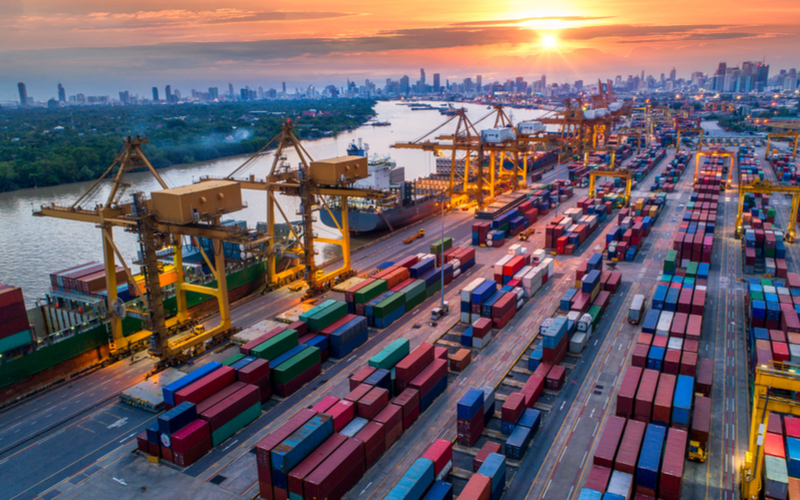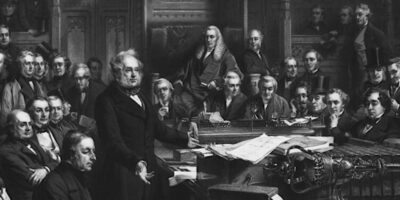Let’s Think Through This Trade Issue, Carefully
The policies and even more the tweets of the current president of the United States have made trade and trade policy a major subject of debate and furious argument, with economists generally holding their heads in despair while the argument rages among the public and politicians.
One feature of the present debate is the way apparently dry-as-dust arguments about trade and trade policy are leading to huge disagreements among people who were formerly political allies and are proving to be decisive in separating one side of politics from another.
In that sense, we are returning to the 19th century, when one of the big divisions in U.S. politics was between Republicans (protectionists) and Democrats (free traders).
This should not surprise us once we realize what is at stake. The difficulty, however, is the way questions of trade are commonly represented in contemporary economics. The economists of the last 70 years have made trade into a technical problem of economic efficiency. In reality, it is a profound question that forces us to confront essential questions about the way we view society and human relations.
The Larger Debate
The division between free trade and protection is actually one of the main aspects of the much deeper contrast and division between individualism and collectivism. The view anyone takes of this matter reveals something about their basic foundational assumptions and beliefs in ways that few other questions do.
Everyone who has studied economics is familiar with the principle of comparative advantage, first formulated by the British economist David Ricardo just over 200 years ago. The argument as presented by Ricardo is that it will be best for countries (or parts of the world) to specialize in some things and get the rest of the goods they require by trade with other countries that have specialized in other things.
The basis of this is the insight that when resources (land, people, and capital) are used to produce one thing, they cannot be used to produce something else. The value of the most valuable alternative use of those resources is the real cost of the thing that is produced.
In Ricardo’s example, Portugal is more efficient than England in producing both wine and cloth (that is, it takes less land, labour, and capital to produce either product in Portugal than it does in England). However, the cost of producing cloth in Portugal (forgone production of wine) is higher than in England. This means it makes sense for Portugal to specialize in wine and England in cloth. The result is not only that both are better off but that the total production of both products is higher than if the two countries had each tried to produce both.
A Radical Insight
This way of putting things has two features. The first is that it is countries that trade with each other; the second is that the main point of free trade is that it increases productive efficiency. The first point is actually false, while the second is true but not the most important thing to consider. Ricardo actually failed to grasp the truly radical nature of his insight, which should lead us to see the world in a fundamentally different way from the fashion in which it is usually portrayed.
To grasp the point, imagine the following thought experiment. We have a world in which human beings live in self-sufficient households. Each household produces all that it consumes: it grows and makes its own food, makes the clothes its members need, brews its own beer, and makes everything else it needs. There is no trade between households. This would be an amazingly impoverished world: people would be barely able to survive.
The reason of course is that time is the ultimate finite resource: hours spent growing grain or grinding it cannot be spent making tools or clothes. This means the total amount that can be produced is very low. In reality, no such society has ever existed, as far as we can tell. Instead, human beings trade with each other; they cooperate through mutually beneficial exchange. Some households concentrate on producing food, others clothing, others tools, others beer.
In doing this, they follow the principle Ricardo set out. Each household or even individual person will do the thing that has the lowest cost in terms of the forgone alternative use of time.
Two Neighbors
Suppose in our world we have two neighbors, Jack and Jill. Jill is a better gardener than Jack and also a better brain surgeon. The cost to her of tending her garden is to forgo doing brain surgery, which is a high cost. By contrast, the cost to Jack of gardening is low because he is a hopeless surgeon.
So it makes sense for Jill to concentrate on surgery and pay Jack to tend her garden. Both are better off, and everyone else gains as well. Jill’s patients are better treated while others gain from Jill’s well-tended garden.
The point is that at the level of households, or individuals such as Jack and Jill, the principle of comparative advantage still applies. This has several very extensive implications. The first is that analytically it is individuals that trade, not countries. “Portugal” is simply shorthand for “the people who live in the part of the Iberian Peninsula commonly known as Portugal,” and “England” stands for “the people who live in the part of the British Isles usually called England.”
Economically, countries are just aggregations of individuals who live under a common legal and political order. (Politically, of course, Portugal and England are meaningful entities; that, however, is another story that also needs unpacking.)
Borders Do Not Matter
What follows from this is that in terms of the nature of the exchange and the specialization that results, there is absolutely no difference between trade across a geopolitical border and trade within such a border. If someone in Chicago consumes a steak from a steer raised in Texas, he is trading with a person or persons in Texas; if he consumes an Argentine steak, he is trading with a person or persons on the Argentinean Pampas. The nature of the exchange and consumption is the same in both cases; economically, they are identical. The difference between them is political and reflects the fact that political power has placed barriers to some kinds of trade and not others.
This perspective also means that trade and the principle of comparative advantage are fundamental aspects of social cooperation. It is trade for mutual benefit, and the specialization according to comparative advantage that follows, that connects individuals and households into a larger, complex society, with huge benefits for all.
The most striking conclusion we can derive, however, is this: outside our theoretical world of self-sufficient individuals or households, there is always free trade to some degree. That is to say, there is always some part of the planet’s surface within which the people living there engage in free trade with each other, following the benefits from identifying comparative advantage.
How Big?
The question, therefore, is not whether to engage in free trade or protection. Rather, it is where the limits of the area of free trade should be drawn. How big should the area and population engaged in free trade be?
The answer of economics to that question, ever since Ricardo, has been simple: the area should be as large and contain as many people as possible. This is what will maximize the beneficial effects of specialization and increase output to its maximum possible level for any given level of technology. Therefore, this is what will maximize overall human welfare. Ideally, it should be the entire human world — the oikumene, as the ancient Greeks called it.
Why, though, is it not the entire world? The reason is that if a part of the planet’s surface is fenced off and people are allowed to trade freely with others who live within those bounds but not with those on the other side of them, the welfare of the majority will be reduced because some people will be unable to specialize as they would if they were free to do so. However, others within the bounds will actually be better off because they will be able to exchange with others within the bounds who in the absence of those restrictions would exchange with people outside them. In other words, restricting free trade to a specific part of the planet transfers resources from the majority of the people who live there to a minority.
The Problem of Collectivism
Why though do the majority of the majority put up with the restrictions? There are many reasons, but one of the main ones is ethical and political collectivism. The argument given above sees society as ultimately consisting of individuals who exchange with each other. The result of these exchanges between individuals is benefit to everyone, as each person does the thing that has the lowest comparative cost.
The contrary view is that people are actually not individuals but part of a collective entity, a nation or state or people, that has a prior claim on them over and above their own interests and welfare. In this way of thinking, the world is composed not of individuals but of collectives, of tribes or nations. The aim of rules and policy should be not the welfare of individual men and women but that of the collective.
In practice, however, the collective means the small number of people who have power in one form or another and can identify their own particular interests with the interest of the population as a whole. Moreover, this way of thinking sees the world as composed of groups engaged in a game in which one group’s gain is always another one’s loss. This is a very dangerous way of thinking, and its usual outcome eventually is armed conflict rather than peaceful exchange.
Historically, the area within which free trade took place was often much smaller than the political unit as a whole. In ancien régime France, for example, there were many barriers to trade within the French kingdom, between different provinces. This used to be a phenomenon common to all civilizations.
However, in the modern world, the area of free trade came to be coterminous with the political entity, and at this point the idea of nationalism entered the argument. Today, arguments about trade are heated, just as they were in the 19th century, because they pose a fundamental question: individualism or collectivism?
Should the political order reflect a vision of society as a free association of individuals engaging in free exchange for mutual and general benefit and creating a complex society thereby? Or should it come from one that sees membership of a collective entity as primary and allows trade among insiders but puts barriers in the way of trade with outsiders?
This is a fundamental question, so the responses people have to apparently boring questions about trade tell us a great deal about their underlying vision of the world.












